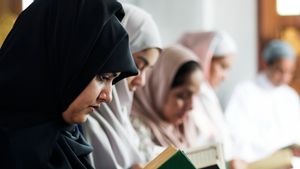JAKARTA Dropped out of school is still an unresolved phenomenon in the world of Indonesian education. The Central Statistics Agency (BPS) noted that the number of school dropouts in Indonesia continued to increase from 2019 to 2022. Even the dropout rate increased from a lower level to a higher level.
In detail, the dropout rate at SD level reached 0.13% in 2022. The percentage increased 0.01% compared to 2021 which was 0.12%. At the junior high school level, the dropout rate was recorded at 1.06% in 2022. This percentage also increased by 0.16% points from the previous year which was 0.90%. Then the dropout rate at the high school level reached 1.38% in 2022 which also rose 0.26% points from the previous year which was 1.12%. This shows that there were 13 children from 1,000 residents who dropped out of school at that level.
Seeing this, the Teacher Community of the Sharing Satkaara (KGSB) held a Webinar 'Prevents and Handles School Dropout Youth Through Psychosocial Concession' as an effort to reduce school dropouts. This webinar presents two resource persons who are experts in education and counseling, namely Ana Susanti, M.Pd. CEP, CHt. who is the Founder of the BK Teacher's House and Widyaiswara of the West Java Province Mobilizing Teacher Center of the Ministry of Education and Culture of Research and Technology of the Republic of Indonesia and Yuliezar Perwira Dara, S.Psi., M.Psi., Psychologists are Lecturers of the Department of Psychology, Universitas Brawijaya.
KGSB founder Ruth Andriani said that dropping out of school is a problem that requires collaboration from all parties, especially teachers as at the forefront. As many as 81% of KGSB teacher members have students who drop out of school. The biggest reason is because of the bad environmental influence, lack of motivation to learn, and unharmonic family factors. We hope that this activity can be a solution, as well as a moment for teachers to act clearly in preventing students from dropping out of school, said Ruth.
BPS through the 2021 National Economic Survey (Susenas) revealed that 76% of families admit their children have dropped out of school for economic reasons. Most of them are 67.0% of them are unable to pay tuition fees, while the rest is 8.7% because children have to earn a living.
A lecturer at the Department of Psychology at Brawijaya University, Yuliezar Perwira Dara, S.Psi., M.Psi., Psychologists say that the cause of dropping out of school is not only caused by economic factors, but many factors that influence these conditions. Some of them are early marriage, bullying, lack of motivation, lack of awareness of students and parents about education, to diversity or heterogeneity of students that leads to maladaptive behavior, causing school termination.
The handling that can be done is to prevent students who are at risk of dropping out of school. Identification can be seen from attitudes, behavior, and discipline in schools. Second, intensive assistance by teachers or students' environment.
Third, psychoeducation through self-service to students to avoid factors that can cause dropping out of school. Fourth, provide training or provide life skills or those related to student interests.
SEE ALSO:
Then intervention can be done, one of which is through counseling. Counseling can be done to individuals and groups. Intervention through counseling can be done directly to students, or through family, peers, to the school. This prevention and intervention is expected to reduce the number of dropouts to increase students' psychology and quality.
For this reason, a psychosocial approach can be taken by teachers to prevent and overcome the problem of dropping out of school experienced by students. Through psychosocial counseling, teachers can explore or emphasize two factors, namely internal and external students. The internal factors that can be explored from students are student problems identification, increasing self-esteem or self-esteem, GRIT or strength passion and persistence, resilience or resilience, self-efficacy or self-confidence, future self-image, and career choices.
Then in external factors, namely social support from the environment, the role of schools in creating a comfortable environment, as well as economic social assistance from schools. Furthermore, home visits can also be done by teachers to students, and develop social skills such as assertive communication that students can do.
"A good coach or teacher must be able to maintain good relations with students, apply counseling centered on students, have empathy, give positive attention without strings attached, and have sincere and open character," said Yuliezar.
Founder of the BK Teacher's House, Ana Susanti, M.Pd. CEP, CHt. revealed that Counsel Counsel Counseling (BK) must be able to identify students who have the potential to drop out of school. Teacher BK can conduct assessments to students by collecting data through talent and interest tracing. The data collected can be in the form of a list of attendance, behavior at school, and academic development of students. But the most important thing is that teachers can convince students of things that may happen in the future if students experience dropping out of school, said Ana.
Various efforts have been made to overcome the problem of dropping out of school, for example, as was done in Banyuwangi Regency, East Java. Until the end of 2022, there were a total of 4,834 students who had to stop schooling in Banyuwangi Regency. Various innovations were launched by the local Regency Government, such as the Asuh Sebaya Student (SAS) program, as well as the Regional Movement for Lifting Youth Out Schools (Garda Ampuh). The program has even received awards.
The English, Chinese, Japanese, Arabic, and French versions are automatically generated by the AI. So there may still be inaccuracies in translating, please always see Indonesian as our main language. (system supported by DigitalSiber.id)















